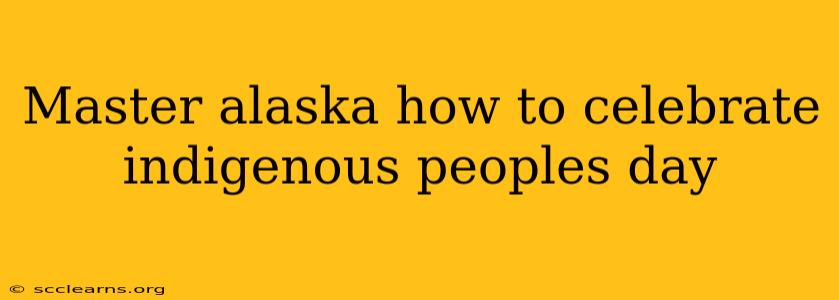Indigenous Peoples' Day, celebrated on the second Monday of October, offers a powerful opportunity to honor the rich history, culture, and contributions of Alaska Native peoples. It's more than just a day off; it's a chance to learn, reflect, and engage in meaningful ways. This guide will help you master celebrating this important day in Alaska.
Understanding the Significance in Alaska
Alaska's Indigenous cultures are incredibly diverse, encompassing numerous tribes and nations, each with its unique traditions, languages, and perspectives. Celebrating Indigenous Peoples' Day in Alaska requires understanding this diversity and approaching the day with respect and sensitivity. It's not about a single, monolithic celebration, but rather about recognizing the contributions and resilience of many distinct groups.
Moving Beyond Columbus Day: A Deeper Understanding
The shift from Columbus Day to Indigenous Peoples' Day represents a crucial acknowledgement of the injustices suffered by Indigenous populations throughout history. In Alaska, this understanding is particularly important, given the complex history of colonization and its lasting impacts on Alaska Native communities. Celebrating Indigenous Peoples' Day is about actively acknowledging this history and working towards a more equitable future.
Ways to Celebrate Authentically in Alaska
Authentic celebration means engaging with Indigenous communities respectfully and learning directly from them. Avoid cultural appropriation; instead, seek out opportunities to learn and support.
1. Attend Indigenous Events and Festivals
Many Alaskan communities host events and festivals throughout October to celebrate their culture and heritage. These events might include traditional dances, storytelling, arts and crafts demonstrations, and feasts. Research local events happening near you to find opportunities to participate respectfully. Look for events organized by Indigenous communities, not just about them.
2. Support Indigenous-Owned Businesses
Support Alaskan Native artists, craftspeople, and businesses. Purchasing their artwork, crafts, and products directly contributes to their economic well-being and helps preserve their cultural traditions. Look for authentic Alaskan Native art and crafts—avoid imitations.
3. Visit Museums and Cultural Centers
Many museums and cultural centers throughout Alaska offer exhibits and educational programs focusing on Alaska Native history and culture. These institutions provide valuable opportunities to learn about the diverse cultures and traditions of Alaskan Indigenous peoples. Engage respectfully with the exhibits and materials.
4. Learn about Alaska Native History and Culture
Take the time to learn about the history, languages, and traditions of Alaska's Indigenous peoples. Numerous resources are available online and in libraries. Engage in respectful learning, understanding that cultural knowledge belongs to the people who hold it. This is a continuous journey, not a one-day task.
5. Engage in Meaningful Dialogue
Engage in conversations about Indigenous issues with respect and empathy. Listen to the experiences and perspectives of Alaska Native people. Be open to learning and understanding different viewpoints.
Respectful Engagement: Key Considerations
- Seek out Indigenous voices: Prioritize resources and information created and shared by Indigenous people themselves.
- Avoid stereotypes: Refrain from perpetuating harmful stereotypes or generalizations about Alaska Native cultures.
- Ask for permission: Always seek permission before taking photos or recording events.
- Be mindful of language: Use culturally appropriate language and terminology.
- Support Indigenous-led initiatives: Actively support initiatives and organizations that are led by Alaska Native people.
By following these guidelines, you can master celebrating Indigenous Peoples' Day in Alaska in a way that is truly meaningful and respectful. Remember, this day is not just about celebration; it's about acknowledging the ongoing struggle for justice, equality, and self-determination of Alaska's Indigenous peoples. It's a commitment to learn, understand, and support these communities throughout the year, not just on one day.

